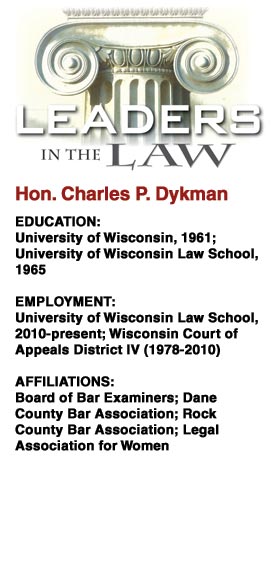Love of law keeps Dykman involved
By: David Ziemer, [email protected]//February 16, 2011//
Hon. Charles P. Dykman – Wisconsin Court of Appeals
Lifetime Achievement Award

 Some lawyers read Palsgraf v. Long Island Railroad Co. (N.Y.1928) in Torts on the first day of law school, but don’t give it much thought for the rest of their careers. Then, there’s Judge Charles P. Dykman.
Some lawyers read Palsgraf v. Long Island Railroad Co. (N.Y.1928) in Torts on the first day of law school, but don’t give it much thought for the rest of their careers. Then, there’s Judge Charles P. Dykman.
For those in the former group who have forgotten the case, the majority held in Palsgraf that the defendant owed no duty to the plaintiff, because the possibility of injury to him was too remote. The minority disagreed, opining that everyone in the world owes a duty of care to everyone else.
Wisconsin is nominally in the latter category, but the Supreme Court occasionally decides cases that seem to many attorneys to be more in line with the majority view. And few judges or scholars have spent as much time and thought attempting to resolve the problematic issue of the element of duty in Wisconsin negligence law than Judge Dykman. (For whatever it’s worth, Dykman is personally an adherent of the minority view in Palsgraf.)
Perhaps not coincidentally, the final opinion he wrote as a Court of Appeals judge this summer, after 32 years on the bench, dealt with just that issue. It is likely to be cited for many years to come as the definitive treatise on duty in Wisconsin law. Tesar v. Anderson, 2010 WI App 116.
Dykman has also been a frequent lecturer on the issue over the years, speaking to bar associations and other judges at the state’s judicial conference.
But he’s not done yet. After serving on the Court of Appeals from its inception in 1978 until retiring last year, he now serves on the faculty at the University of Wisconsin Law School, teaching, naturally, an elective course on methodology in negligence cases.
Dykman also joined the Board of Bar Examiners after retiring from the court, writing questions for, and grading the answers of, aspiring attorneys. In addition, he serves on a BBE committee looking into alternatives to the bar exam.
“The impetus was a general feeling that bar exams in no way predict success as a lawyer,” he said. “So why give them?” But he acknowledged that finding a better way is a “broad challenge.”
Dykman is enjoying that challenge, though, as well as teaching at the law school.
“I did not want to give up the law when I retired from the bench.”
Legal News
- Wisconsin joins Feds, dozens of states to hold airlines accountable for bad behavior
- Trump ahead of Biden in new Marquette poll
- Bankruptcy court approves Milwaukee Marriott Downtown ‘business as usual’ motion
- New Crime Gun Intelligence Center to launch in Chicago
- Arrest warrant proposed for Minocqua Brewing owner who filed Lawsuit against Town of Minocqua
- Wisconsin Supreme Court justices question how much power Legislature should have
- Reinhart named the 2024 Wisconsin law firm of the year by benchmark litigation
- Milwaukee’s Common Council now has the most African Americans, women and openly LGBTQ members ever
- Office of School Safety Provides Behavioral and Threat Assessment Management Training Ahead of 25th Anniversary of Columbine Shooting
- Wisconsin Supreme Court to hear arguments in Democratic governor’s suit against GOP-led Legislature
- Lawsuit asks Wisconsin Supreme Court to strike down governor’s 400-year veto
- Wisconsin man pleads not guilty to neglect in disappearance of boy
WLJ People
- Power 30 Personal Injury Attorneys – Russell Nicolet
- Power 30 Personal Injury Attorneys – Benjamin Nicolet
- Power 30 Personal Injury Attorneys – Dustin T. Woehl
- Power 30 Personal Injury Attorneys – Katherine Metzger
- Power 30 Personal Injury Attorneys – Joseph Ryan
- Power 30 Personal Injury Attorneys – James M. Ryan
- Power 30 Personal Injury Attorneys – Dana Wachs
- Power 30 Personal Injury Attorneys – Mark L. Thomsen
- Power 30 Personal Injury Attorneys – Matthew Lein
- Power 30 Personal Injury Attorneys – Jeffrey A. Pitman
- Power 30 Personal Injury Attorneys – William Pemberton
- Power 30 Personal Injury Attorneys – Howard S. Sicula





